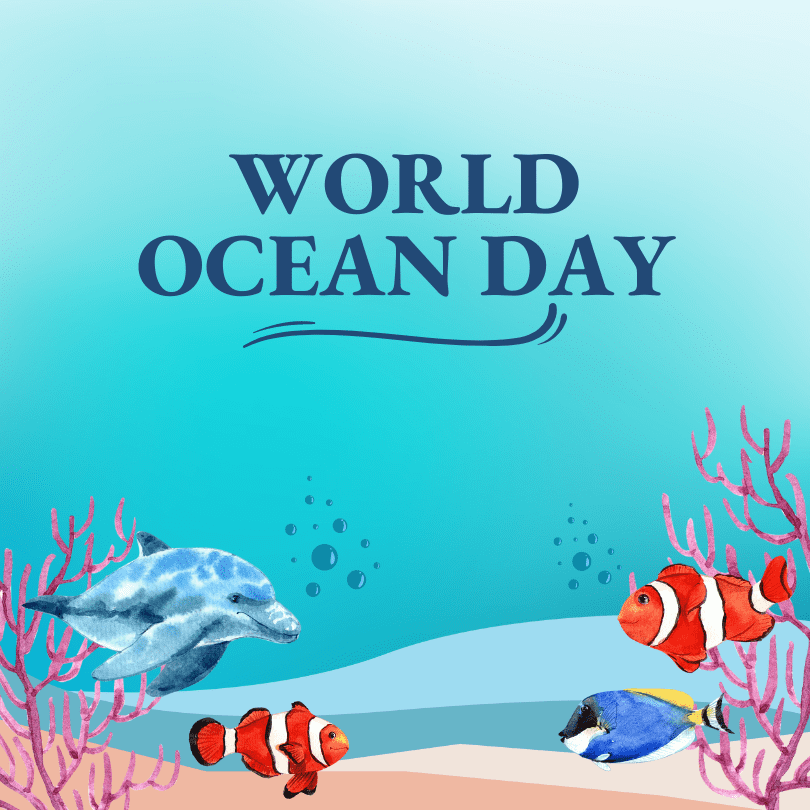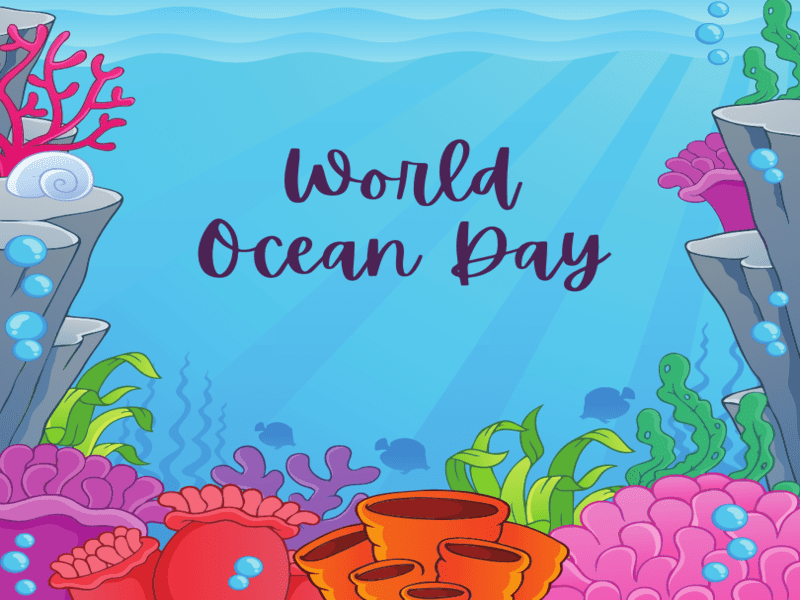Lines on World Oceans Day
World Oceans Day is an annual celebration dedicated to honoring and protecting our magnificent oceans. It falls on June 8th each year and serves as a reminder of the vital role that oceans play in our lives. Here are 20 lines to shed light on the importance of World Oceans Day:
-
- World Oceans Day is a global event that raises awareness about the significance of our oceans.
- It is a day to celebrate the beauty, biodiversity, and resources that the oceans provide.
- Oceans cover about 70% of the Earth’s surface and support countless marine species.
- They regulate the climate, produce oxygen, and absorb carbon dioxide.
- World Oceans Day encourages people to take action to protect and conserve our oceans.
- It highlights the importance of sustainable fishing practices to maintain healthy fish populations.
- The day also promotes the reduction of plastic pollution, which poses a significant threat to marine life.
- World Oceans Day emphasizes the need to preserve coral reefs, essential ecosystems that are under threat.
- It encourages the preservation of coastal habitats, such as mangroves and seagrass meadows, which provide nurseries for marine species.
- The day raises awareness about the impacts of climate change on oceans, including rising sea levels and ocean acidification.
- It calls for the establishment of marine protected areas to conserve biodiversity and safeguard marine habitats.
- World Oceans Day highlights the importance of responsible tourism that minimizes harm to marine ecosystems.
- It educates people about the harmful effects of oil spills and the need for improved oil spill response measures.
- The day promotes sustainable seafood choices to support healthy ocean ecosystems.
- It encourages individuals to reduce their carbon footprint, as climate change affects ocean health.
- World Oceans Day emphasizes the need for international collaboration to address global ocean issues.
- It recognizes the cultural significance of oceans and their role in providing livelihoods for coastal communities.
- The day inspires youth engagement and empowers the next generation to become ocean advocates.
- World Oceans Day calls for innovative solutions to marine pollution, such as developing biodegradable alternatives to single-use plastics.
- It serves as a reminder that by taking care of our oceans, we are ultimately taking care of our planet.
- World Oceans Day promotes awareness about the importance of maintaining clean and healthy oceans for the well-being of marine life and human communities.
- It encourages the reduction of marine pollution, including plastic debris, chemical pollutants, and oil spills, which have detrimental effects on marine ecosystems.
- The day emphasizes the significance of ocean conservation to safeguard biodiversity and preserve fragile marine habitats.
- It raises awareness about the impact of overfishing and advocates for sustainable fishing practices to ensure the long-term viability of fish stocks.
- World Oceans Day recognizes the role of oceans in providing food security and livelihoods for millions of people around the world.
- It fosters appreciation for the cultural, recreational, and economic value of oceans and encourages responsible recreation and tourism activities.
- The day promotes research and scientific exploration to enhance our understanding of ocean ecosystems and inform conservation efforts.
- It calls for increased efforts to combat climate change and its effects on ocean temperature, acidity, and sea level rise.
- World Oceans Day highlights the importance of ocean literacy and education, empowering individuals to make informed decisions and take action to protect the oceans.
- It serves as a platform for organizations, governments, and individuals to collaborate and share innovative solutions for the sustainable management of oceans.
World Oceans Day is a time to reflect on our connection to the seas and to take action to protect and preserve these precious ecosystems. Together, we can ensure the health and sustainability of our oceans for present and future generations.

conclusion
World Oceans Day is a significant global event that shines a spotlight on the vital role that oceans play in our lives. It serves as a call to action for individuals, communities, organizations, and governments to protect and preserve these invaluable ecosystems. By raising awareness about the importance of sustainable practices, reducing pollution, promoting responsible fishing, conserving marine habitats, and addressing climate change, we can make a positive impact on the health and well-being of our oceans.
World Oceans Day reminds us of our interconnectedness with the seas and the profound influence they have on our planet’s health and stability. It highlights the need for collaboration, innovation, and education to ensure the long-term sustainability of our oceans for future generations. By coming together and taking action, we can create a future where oceans thrive, biodiversity flourishes, and coastal communities prosper.
Let us embrace the spirit of World Oceans Day and commit to making a difference. Whether it’s through individual actions or collective initiatives, every step we take towards ocean conservation matters. Together, we can protect and preserve the oceans, ensuring that they continue to provide us with beauty, resources, and inspiration for generations to come.
How can we save marine life on this World Oceans Day
- Reduce plastic waste: Plastic pollution is a major threat to marine life. Minimize your use of single-use plastics and opt for reusable alternatives. Properly dispose of plastic waste to prevent it from entering waterways and oceans.
- Support sustainable seafood: Choose sustainably sourced seafood to prevent overfishing and support responsible fishing practices. Look for certifications like the Marine Stewardship Council (MSC) to ensure the seafood you consume is harvested sustainably.
- Practice responsible boating and fishing: Be mindful of marine habitats and ecosystems when boating or fishing. Follow regulations, avoid sensitive areas like coral reefs and seagrass beds, and use sustainable fishing gear that reduces bycatch.
- Conserve water: Adopt water-saving habits to reduce freshwater consumption. By conserving water, you can help maintain healthy ecosystems that support marine life, as freshwater inflows are crucial for estuaries and coastal areas.
- Minimize chemical pollution: Avoid using harmful chemicals, such as pesticides and fertilizers, that can end up in water bodies and harm marine life. Opt for environmentally friendly alternatives and dispose of chemicals properly.
- Support marine protected areas: Advocate for the establishment and maintenance of marine protected areas (MPAs) that provide safe havens for marine species. Support organizations working to create and enforce MPAs.
- Participate in beach clean-ups: Join or organize beach clean-up events to remove litter and debris from coastal areas. This helps prevent marine animals from ingesting or getting entangled in trash.
- Educate and raise awareness: Spread awareness about marine conservation by sharing information, participating in educational programs, and engaging in conversations with others. Encourage responsible behavior and the importance of protecting marine ecosystems.
- Support conservation organizations: Donate to reputable marine conservation organizations and support their efforts to protect and preserve marine life. These organizations conduct research, promote sustainable practices, and advocate for policy changes.
- Practice responsible tourism: When engaging in marine activities like snorkeling, diving, or wildlife watching, choose operators that follow responsible and ethical practices. Respect marine life and their habitats, and never touch or disturb them.
By taking these actions, we can collectively make a difference in saving marine life and ensuring the long-term health and sustainability of our oceans. Remember, even small changes in our daily lives can have a significant impact on preserving the diverse and fragile ecosystems that marine life depends on.
Certainly! Here are 10 frequently asked questions (FAQs) related to World Oceans Day:
- What is World Oceans Day?
- World Oceans Day is an annual global event celebrated on June 8th to raise awareness about the importance of oceans and promote their conservation.
- Why is World Oceans Day important?
- World Oceans Day is important because it highlights the critical role oceans play in sustaining life on Earth and emphasizes the need to protect and preserve them for future generations.
- What is the theme for World Oceans Day?
- The theme for World Oceans Day varies each year. It focuses on specific issues related to ocean conservation and sustainability.
- How can I participate in World Oceans Day?
- You can participate in World Oceans Day by organizing or attending events, participating in clean-up activities, spreading awareness on social media, supporting ocean conservation organizations, and making sustainable choices in your daily life.
- What are some ways to protect the oceans?
- Some ways to protect the oceans include reducing single-use plastic consumption, practicing responsible fishing, supporting sustainable seafood choices, reducing carbon emissions, and promoting marine conservation initiatives.
- How does plastic pollution affect the oceans?
- Plastic pollution in the oceans poses a significant threat to marine life. It can entangle marine animals, cause ingestion and digestive issues, and disrupt ecosystems. It also contributes to the degradation of water quality.
- How does climate change impact the oceans?
- Climate change affects the oceans in various ways, including rising sea levels, increased ocean acidity, coral bleaching, altered marine habitats, and shifts in marine species’ distributions.
- Why is sustainable fishing important for ocean health?
- Sustainable fishing practices are crucial to ensure the long-term health and productivity of fish stocks and marine ecosystems. They help maintain biodiversity, prevent overfishing, and support the livelihoods of communities dependent on fishing.
- How can I support marine conservation efforts?
- You can support marine conservation efforts by donating to organizations dedicated to ocean conservation, volunteering for clean-up and restoration activities, participating in citizen science projects, and advocating for policies that protect marine environments.
- How can I educate others about the importance of oceans?
- You can educate others about the importance of oceans by sharing information on social media, organizing educational events or workshops, engaging in discussions with friends and family, and supporting educational programs that focus on marine conservation.
Remember, World Oceans Day is an opportunity to learn, engage, and take action to protect our oceans. By being informed and actively participating, you can make a positive difference in the health and sustainability of our oceans and contribute to a better future for our planet.





Leave feedback about this